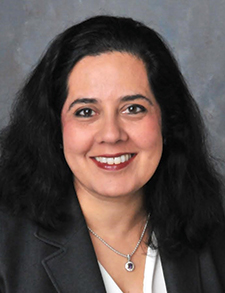
Sujana S. Chandrasekhar, MD -Partner, ENT and Allergy Associates in Parsippany, N.J.; president, American Otological Society; director of neurotology, James J. Peters Veterans Administration Medical Center in Bronx, N.Y.; clinical professor of otolaryngology, Zucker School of Medicine at Hofstra-Northwell in Hempstead, N.Y.; clinical associate professor of otolaryngology, Icahn School of Medicine at Mount Sinai in New York; staff physician, Lenox Hills Hospital and Manhattan Eye, Ear, Throat Institute, James J. Peters Bronx VA Medical Center, Mount Sinai Hospital, New York Eye and Ear Infirmary, and Saint Barnabas
Explore This Issue
August 2024Medical Center.
Dr. Sujana Chandrasekhar earned her medical degree at Mount Sinai School of Medicine and completed her internship and residency at New York University Medical Center and her fellowship in otology/neurotology at the House Ear Clinic and Institute in Los Angeles. She has been in practice for 30 years.
Q: What has your career trajectory been since completing your fellowship?
I started my career in academic practice, went into solo private practice 10 years later, and then added a part-time position at the VA Medical Center. Six years ago, I joined a large, single-specialty private practice, where I am a partner. I now teach residents from several different ENT residency programs and mentor people in practice, both in my private practice and in academic institutions. I see about 90 to 100 patients per week, and I operate one to two days a week. I very much enjoy service and leadership. In my roles for the Triological Society and as consulting editor for Otolaryngologic Clinics of North America, I keep up with cutting-edge practice, research, and education across the entire field of otolaryngology (more than my subspecialty of otology/neurotology). For Clinics, I established a podcast where I interview each publication’s guest editors. During the pandemic closures, I co-executive produced and co-hosted a video web show called She’s On Call [currently viewable on YouTube]. It was stimulating and I honed my onscreen personality, but it was about 10 extra hours of work per week per show.
Q: What made you decide to move from academic to private practice?
I thought I would live and die in the ivory tower of academic medicine. A decade into it, I found that it was not to be. The following things happened after I left academics and went into private practice: I had my fourth child; I made a lot more money; and I did more research and academic writing, as my time was not spoken for outside of patient hours. I am more accessible to patients and referring doctors, and I can teach students and residents from several academic institutions. I also found a passion for leadership. I love to travel, and I speak on ENT and leadership around the world. I am accountable to myself, and I can follow my passions. It takes some bravery to leave the ivory tower, but it can be done.